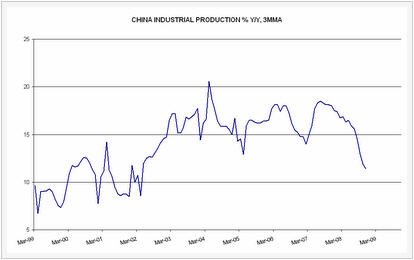Friday was a milestone in the evolution of the ongoing financial crisis. No, not the employment data, which was execrable (and prompted Goldman to raise their unemployment rate forecast to an eye-watering 8.5%.) In fact, Friday was notable because it was the first time in quite a while that Macro Man can recall being bored at the office.
It seems as if markets have mentally shut down and are content to limp into the end of the year. Liquidity has certainly dried up amongst many of the products that Macro Man trades, and declining volumes in a number of exchange-traded assets also bear testament to a lack of engagement. Moreover, the ever-reliable blog traffic indicator has shown a reasonable decline in eyeballs from the panicky markets of a month ago. As always, that is perhaps explainable by the dearth of quality of the commentary in this space…but nevertheless it would appear to indicate a waning interest in the day-to-day saga of the financial meltdown.
So it was with much elation that Macro Man and other punters greeted Sunday’s announcement of a 4 trillion yuan Chinese stimulus package. Hurrah! A return to working on the weekends and wondering where Wellington will open FX rates on Sunday evening (London time.)
The rationale for the package is fairly obvious. Both anecdotal evidence and official data appear to indicate that the Chinese economy has hit something of a brick wall. Smoothed industrial production growth, for example, has hit six-and-a-half year lows. The property sector has also come under the cosh, and the Shanghai composite index is down 65% on the year following a 7% overnight rally.
Strangely, there appears to be quite a difference in opinion of how significant the package actually is. A number of the measures had been previously announced; still others represent the allocation funds that would have been spent anyways. Moreover, only a minority of the funds are coming from the central government, so the source of the remainder of the money is a trifle opaque.
The ultimate impact is also somewhat nebulous. One shop that Macro Man likes on China has left its 2009 growth forecast unchanged at a below-consensus 7.5%. Another has suggested annual stimulus along the lines of 1.5% per annum.
Predictably, markets have seized on the headline figure (which equates to roughly $586 billion) and rallied risk assets without bothering to consider the substance of the program. Given that much of the stimulus appears to be focused on rural housing and infrastructure (which, again, was going to see plenty of investment anyways), it’s not immediately clear to Macro Man why the announcement merits a 2% rally in S&P futures, for example, other than a knee-jerk “buy first, ask questions later” reaction.
Of course, the size of the announcement demands that we ask the question: what exactly does 4 trillion yuan buy?
Lets consider some of the options:
1) 9.25 billion barrels of oil, using the front contract WTI futures price. Of course, there might be a little bit of slippage if China tried to print that particular ticket.
2) Real Madrid, Barcelona, Man United, Chelsea, AC Milan, Bayern Munich, Inter Milan, Arsenal, Juventus, Liverpool, Lyon, Roma, Schalke, Ajax, Rangers, Valencia, Benfica, Celtic, Stuttgart, Werder Bremen, Porto, PSV Eindhoven, Sevilla, Villareal, and Lille……39 times over.
3) Per July’s modest proposal, Alaska, Idaho, Kansas, Montana, North and South Dakota, and Nebraska. They’d raise $560 billion, based on the Macro Man’s calculations. And hey, they’re all “red states”….just don’t tell China that “red” means “Republican”, and perhaps the new administration could get them to pay a premium!
4) HSBC, JP Morgan, Wells Fargo, B of A, Citigroup, and Deutsche Bank. It’s not immediately obvious why China would want to buy these institutions, however; perhaps they’d be buying expertise in how to account away losses?
5) US fourth quarter Treasury issuance. Old habits die hard….
6) Ford and GM….plus Boeing, 3M, Google, and Exxon. It would be ironic if the US government nationalized the US automakers and flogged them off to a foreign buyer just after some American cars received the first non-scathing reviews in the history of Top Gear.
7) The entire market cap of Russia, Mexico, Hungary, and Ireland. They might have trouble taking possession in one of those places, however.
8) Mars. If China waits long enough, the fiscal straits of industrialized country budgets are likely to become so dire that they will happily sell off all future mineral and mining rights to the Martian landscape. And given that China has now put a man in space, perhaps they’ll take delivery sooner than you think!
9) 83.71% of 1 TARP program. Puts it in perspective, doesn’t it?



Leave a Reply